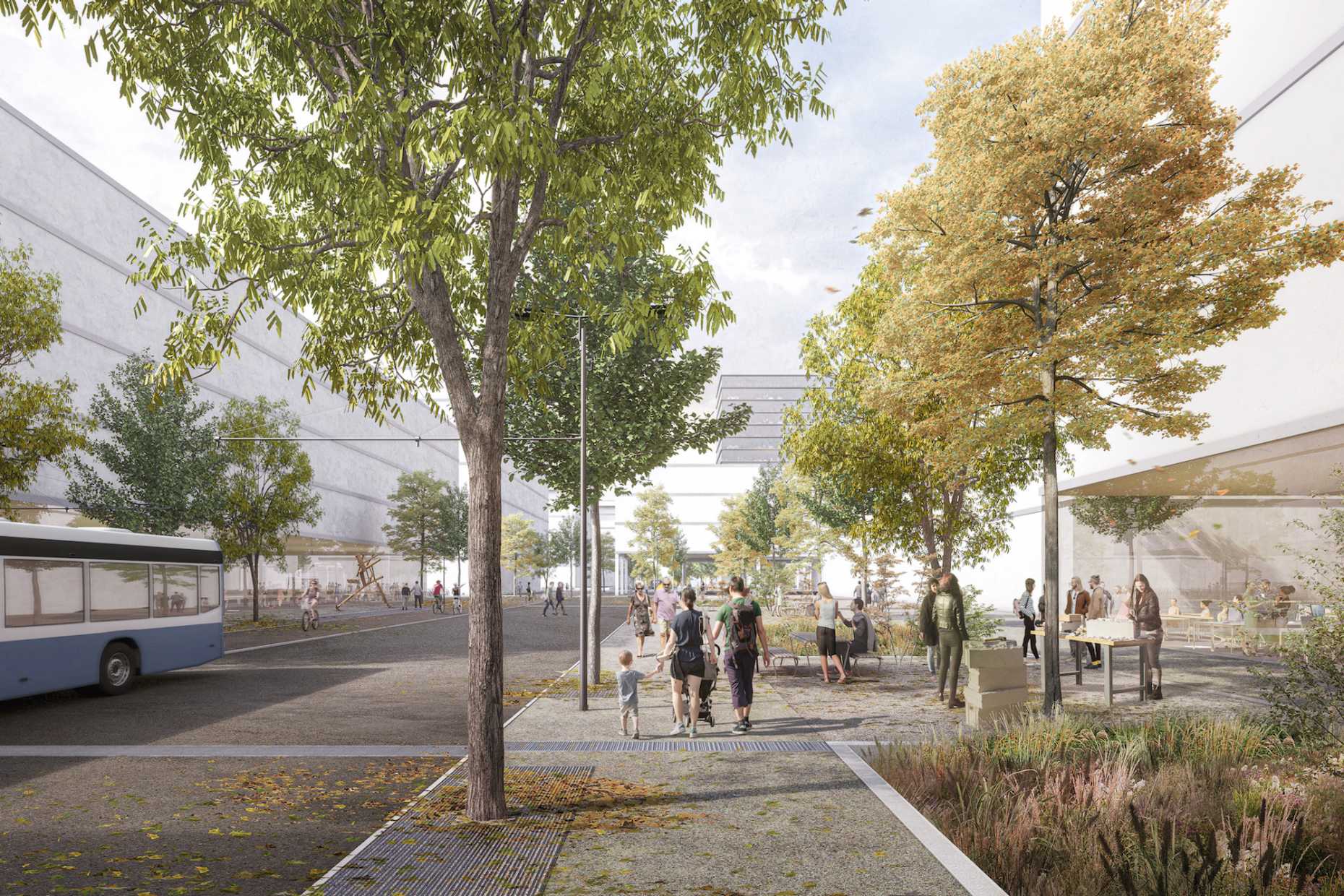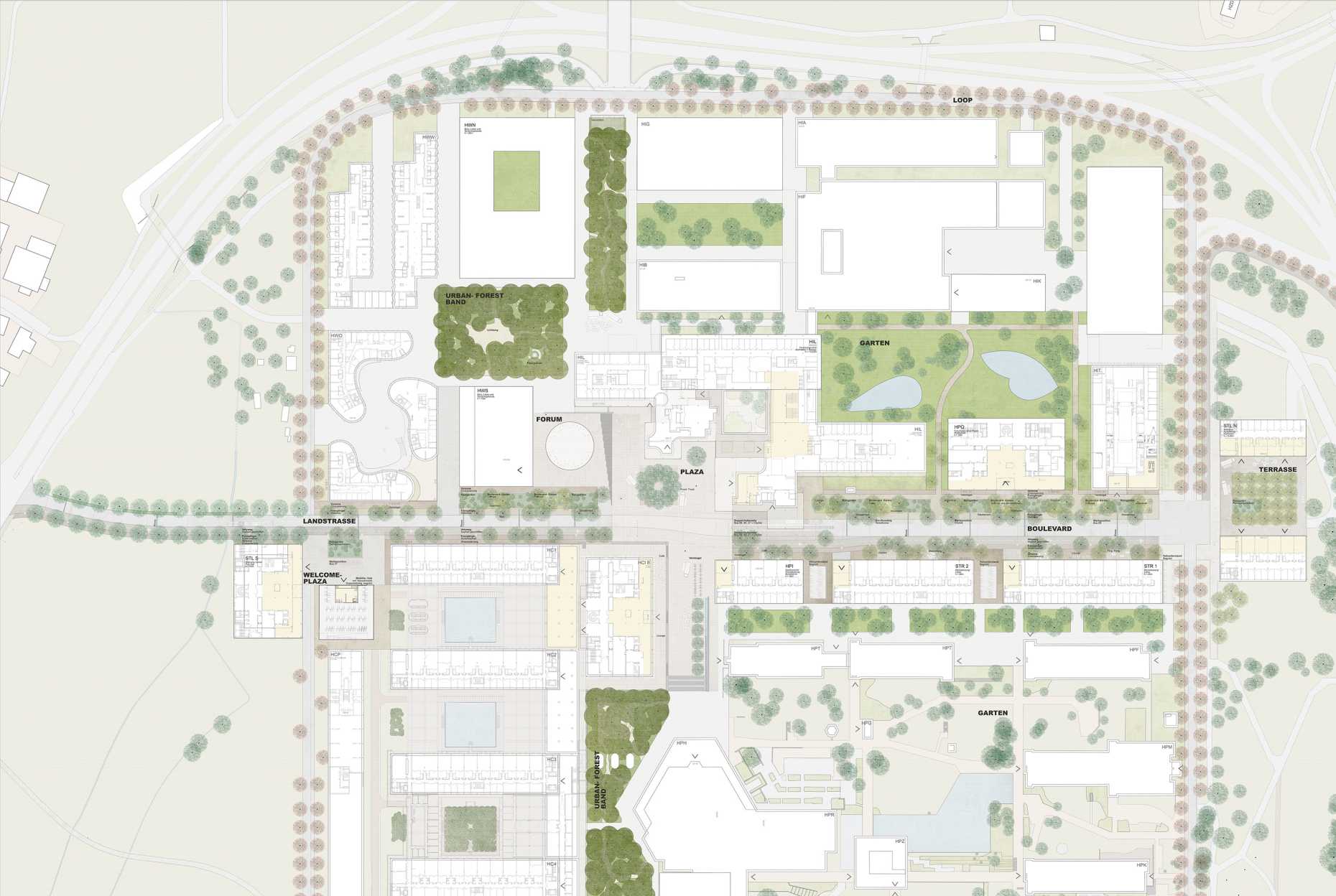Wolfgang-Pauli-Strasse – a vibrant and sustainable space on the campus of the future
By redeveloping Wolfgang-Pauli-Strasse, ETH Zurich plans to address a host of needs including urban planning, transit, open spaces, barrier-free accessibility, local climate, lighting and soil retention.
The 2040 masterplan envisages making the Hönggerberg campus more urban with space for future requirements in the areas of teaching, research and knowledge transfer. ETH Zurich has prioritised taking a holistic approach to the campus and sustainable development. The design and appearance of the open spaces will play a central role in this regard. In the interests of sustainable development and with the conversion of bus lines 69 and 80 to electric buses, the latter being upgraded to double-articulated trolley buses to increase passenger capacity, ETH Zurich commissioned a competitive study on the redesign and upgrade of Wolfgang-Pauli-Strasse.
A proposal was selected for further development that honours the Hönggerberg campus’s historical development from an agricultural campus to a knowledge hub surrounded by agricultural and recreational areas. The aim is to create a more urban setting and at the same time preserve and create green space. Central squares along the Wolfgang-Pauli-Strasse are designed to accentuate the urban character of the campus. For example, a forum will be built next to what is currently Stefano-Franscini-Platz that, together with the square, will function as a central meeting point and event location. A “Welcome Plaza” on the south side with a focus on mobility issues and a terrace on the north side are also planned as a meeting point for work, leisure and gastronomy for the two entrance sides of the campus that lead from the surrounding Hönggerbergring to the Wolfgang-Pauli-Strasse.
The Wolfgang-Pauli-Strasse itself has been conceived as a place for interaction and activity, with cafes, shops and exhibition spaces open to the public on the ground floors. Both sides are to be landscaped with greenery. In addition to shady trees and seating areas, shrubbery and planted beds – “rain gardens” – for soil retention will lend the Wolfgang-Pauli-Strasse its particular character. One central aspect of the selected submission is the “urban forests” that run along the axis crossing the campus, creating a connection at the heart of the campus between the Käferberg and Zürichberg forests that lie alongside.
Traffic routes are planned as follows:
Delivery and service traffic will continue to use the Hönggerbergring; the battery-powered ETH Link, the VBZ buses on line 37 and the planned electric buses for lines 69 and 80 (the latter as double-articulated trolley buses) will continue to use Wolfgang-Pauli-Strasse. Bicycle and pedestrian traffic will be able to use both routes. The Ringstrasse will be upgraded to a transit route for bike traffic between Höngg and Affoltern. This will create parallel lanes for each mode of transport along the Wolfgang-Pauli-Strasse – including a separate lateral cycle lane for direct access to the campus. ETH Zurich puts particular emphasis on barrier-free design and spacious, safe areas for pedestrians.
The concept envisages the Wolfgang-Pauli-Strasse as a lively and attractive place for students and members of the ETH community, guests, campus visitors and residents from the surrounding neighbourhood to meet and interact.
Competition
Eleven general planning teams submitted applications, of which four were approved for participation. ETH Zurich would like to thank all the participating teams and congratulates the team from Studio Vulkan in Zurich on its project proposal, which was recommended for the next phase of the project.
The following teams also took part in the commissioned study:
- ARGE Boulevard – Balliana Schubert Landschaftsarchitekten / Locher Ingenieure AG
- ARGE Schmid Kuhn
- befair partners ag
The Downloadfinal report (PDF, 11.9 MB)vertical_align_bottom includes further details on the project proposals submitted.
Further information
- ETH Hönggerberg campus 2040
- Sustainability, Campus
- Mobility Platform
- Barrier-free at ETH Zurich
- external pageVBZ, conversion of lines 69 and 80call_made
Further articles on the development of the Hönggerberg campus
- Hönggerberg campus development finds approval (ETH news, 02.10.2020)
- Sustainable mobility on campus: the ETH Link is going electric (Internal news, 10.09.2020)
- How the campus of the future will develop (ETH News, 11.03.2020)
- Pathway to Campus Hönggerberg 2040 (ETH News, 30.05.2018)
- ETH can densify at Hönggerberg (press release, 14.12.2016)


